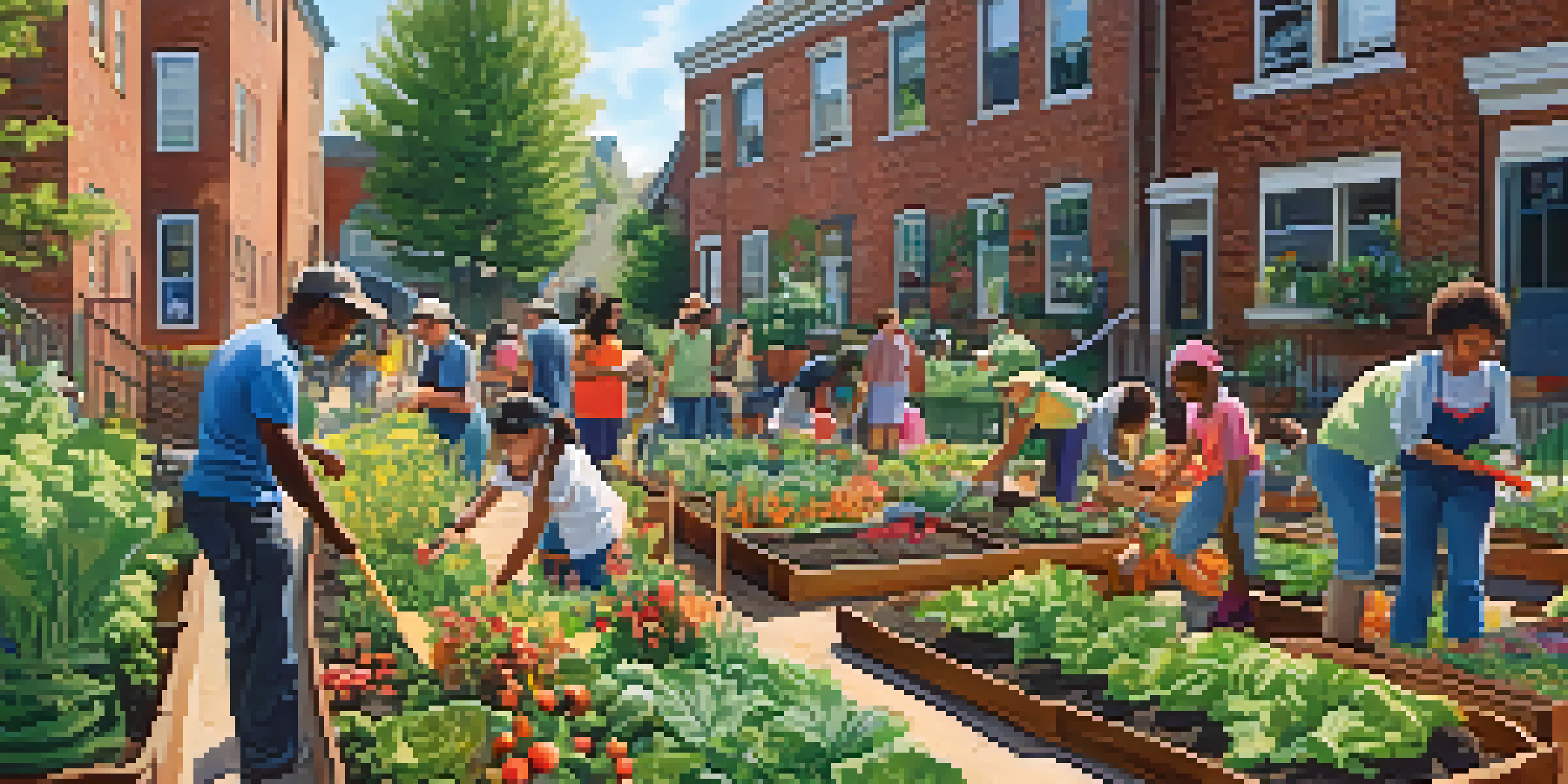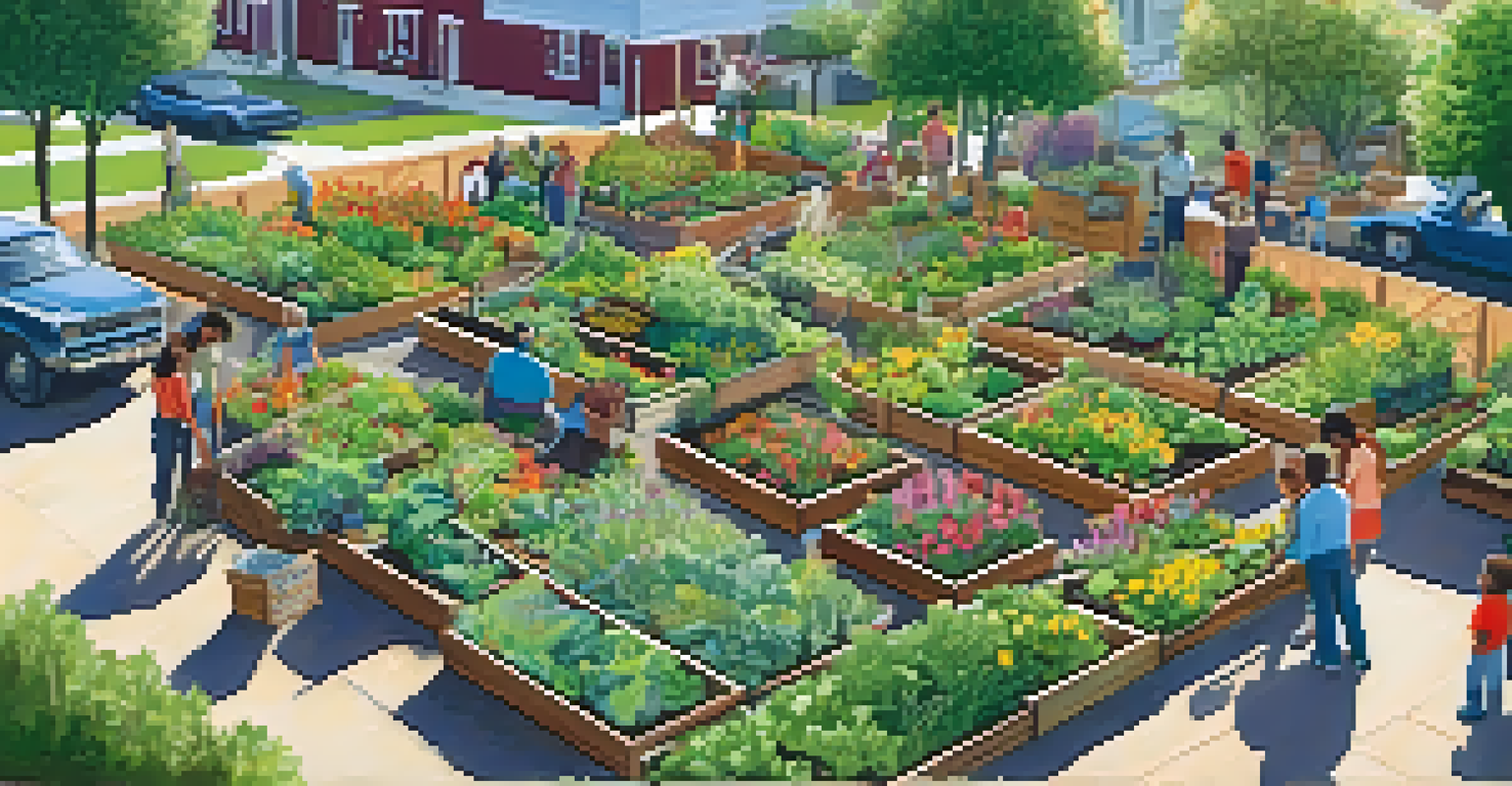The Impact of Community Gardening on Physical Fitness Levels

Understanding Community Gardening and Its Appeal
Community gardening involves people coming together to cultivate shared spaces, often in urban areas. This practice not only beautifies neighborhoods but also fosters social connections among participants. The appeal lies in the collective effort, where individuals contribute their time and skills to grow fresh produce.
Gardening is a way of showing that you believe in tomorrow.
These gardens can range from small plots to larger public spaces, and they often encourage sustainable practices. As a result, participants learn about gardening techniques while enjoying the fruits of their labor. The sense of community created through these gardens is a vital aspect that enhances the experience for everyone involved.
Moreover, community gardens can serve as a hub for educational workshops, teaching participants about nutrition and healthy living. This holistic approach to gardening promotes not just the physical act of growing food but also a lifestyle that values health and wellness.
Physical Activity Levels in Community Gardening
Engaging in community gardening is an excellent way to incorporate physical activity into daily routines. Tasks such as digging, planting, weeding, and harvesting require various movements that can significantly improve fitness levels. Unlike traditional workouts, gardening can feel less like exercise and more like a rewarding hobby.

Research shows that gardening can provide similar health benefits as moderate-intensity aerobic activities. This means that participants can enhance their cardiovascular health while enjoying the outdoors and connecting with others. It is also an excellent way to combat sedentary lifestyles, especially in urban environments.
Community Gardening Builds Connections
Community gardening fosters friendships and support networks, enhancing social well-being in urban areas.
Additionally, gardening encourages a range of movements, from bending and stretching to lifting and carrying. These activities help to build strength and flexibility over time, making it a well-rounded form of exercise that benefits individuals of all ages.
Mental Health Benefits of Gardening
The benefits of community gardening extend beyond physical fitness; they also significantly impact mental health. Spending time in nature has been shown to reduce stress, anxiety, and depression. The act of nurturing plants can foster a sense of purpose and accomplishment, boosting overall well-being.
To plant a garden is to believe in tomorrow.
Moreover, engaging in gardening provides an opportunity for mindfulness, allowing individuals to focus on the present moment. This meditative aspect can be incredibly beneficial in today's fast-paced world. Just as a walk in the park can elevate your mood, tending to a garden can create a similar sense of tranquility.
Additionally, the social aspect of community gardening fosters connections with others, which is essential for mental health. Sharing experiences, knowledge, and even produce can create strong bonds that enhance feelings of belonging and support.
Community Gardening and Nutrition Awareness
Community gardens often lead to increased awareness of nutrition and healthy eating habits. Participants have direct access to fresh fruits and vegetables, which can encourage healthier food choices in their diets. This access can be particularly impactful in food deserts, where fresh produce is scarce.
By engaging in gardening, individuals learn about the nutritional value of various crops. This education empowers them to make informed decisions about their meals and overall health. The joy of eating freshly harvested produce can transform one's relationship with food.
Gardening Enhances Physical Health
Engaging in community gardening provides a fun way to incorporate physical activity into daily routines, promoting fitness and overall health.
Moreover, community gardens can serve as platforms for nutrition workshops and cooking classes. These initiatives provide valuable skills and knowledge that can help participants incorporate more fruits and vegetables into their diets, ultimately improving their health.
Building Community Connections through Gardening
One of the most significant impacts of community gardening is the sense of belonging it fosters. Participants often form friendships and support networks, which can enhance their social well-being. This connection to others can be particularly beneficial in urban areas where isolation is common.
Gardening as a group encourages collaboration and teamwork, allowing individuals to work together towards a common goal. This shared purpose can lead to a strong sense of community pride and ownership. When people invest their time and energy into a garden, they are more likely to care about the environment and their surroundings.
Additionally, community gardens can serve as gathering spaces for local events, further strengthening connections. These interactions not only improve social ties but also create a vibrant community atmosphere that benefits everyone involved.
Sustainable Practices Promoted by Community Gardening
Community gardening often emphasizes sustainable practices that benefit both participants and the environment. Techniques such as composting, crop rotation, and organic gardening help to minimize the ecological footprint of food production. Participants learn to appreciate the importance of sustainability while actively engaging in it.
By practicing these methods, gardeners contribute to soil health and biodiversity, which are essential for a thriving ecosystem. Engaging with nature in this way helps individuals understand their role in environmental stewardship. It’s an educational experience that extends beyond the garden gates.
Nutrition Awareness Through Gardening
Participants in community gardens gain direct access to fresh produce, increasing their awareness of nutrition and healthy eating habits.
Moreover, adopting sustainable practices in community gardens can inspire participants to implement similar techniques in their own homes. This ripple effect can lead to a broader cultural shift toward environmentally friendly living, making a lasting impact on communities.
Encouraging Lifelong Fitness Habits Through Gardening
Participating in community gardening can instill lifelong fitness habits that promote overall health. The enjoyable nature of gardening makes it easier for individuals to stay active without feeling like they are exercising. This positive association with physical activity can lead to sustained engagement over time.
As people cultivate their gardens, they develop a routine that encourages regular movement, which can translate into other areas of their lives. For instance, the flexibility and strength gained from gardening can enhance performance in various physical activities, from hiking to sports. Essentially, gardening can serve as a gateway to a more active lifestyle.

Additionally, the community aspect of gardening can motivate individuals to stay committed. When people see their friends and neighbors participating, it creates a supportive environment that reinforces healthy behaviors. This sense of camaraderie can make fitness feel less daunting and more enjoyable.